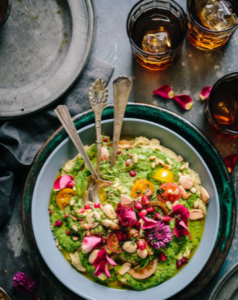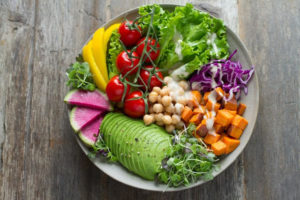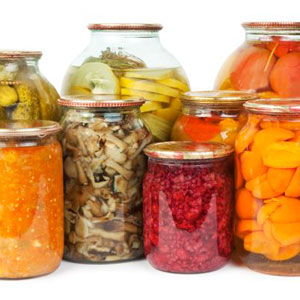 It is hard to fathom that certain food groups can help steady our mental state. Most of us tend to binge eat when we’re stressed, it’s interesting though that there are certain foods that can actually work to reduce scatterbrain and help us feel less anxious and stressed.
It is hard to fathom that certain food groups can help steady our mental state. Most of us tend to binge eat when we’re stressed, it’s interesting though that there are certain foods that can actually work to reduce scatterbrain and help us feel less anxious and stressed.
Once you tune in to how you feel after eating certain foods though you will find the food-mood connection is undeniable.
Your mood influences your behaviour and outlook on life. Mood is not only swayed by the thoughts you think, but by the food you eat. If you are eating junk, you’re probably going to feel like junk. Conversely, eating nutritious, health-promoting foods can make you feel light and full of life.
The link between nutrition and mood is essentially based upon the awareness of how when you eat well, you feel well. They say you are what you eat, and when it comes to mental health, it’s truer than ever.1, 2, 3 When you eat poorly, you feel physically tired, anxious, stressed, and just “blah.”1, 2, 3 There’s also now an increasing amount of research demonstrates the relationship between what we eat and how we feel.
Too much fat, meat, sugar, and processed foods lead to brain fog, low energy, and even anxiety and depression.
Proper nutrition can specifically help mental health, reducing anxiety and stress.3 Complex carbohydrates found in certain fruits, vegetables, and grains help your body release serotonin, the body’s feel-good chemical.5 More serotonin leads to feelings of happiness and tranquillity. Eating well not only lifts your mood but also contributes to a happy, healthy brain. A plant-based diet full of fresh fruits, vegetables, seeds, nuts, and gluten-free whole grains can calm the body and mind.
Here are some reminders on how to use food to boost your mood and calm your stress levels s we all navigate how different life in 2020 has become. I have also included reminders on foods or so-called foods to avoid which will not only slowly tax your health but may trigger anxiety and overwhelm.
 Know Your Carb’s and Do not Be Fooled by Fortified Foods.
Know Your Carb’s and Do not Be Fooled by Fortified Foods.
There are two types of carbohydrates: complex and refined.
Complex carbohydrates are abundant in vegetables, fruits, and some nuts and seeds. Carbohydrates are necessary for brain health and your body relies on carbohydrates to produce serotonin, a powerful “feel-good” neurotransmitter that also balances the sleep-wake cycle. Complex carbohydrates from vegetables, fruits, and some gluten-free grains like quinoa and buckwheat are the best nutritional sources for keeping neurotransmitter health in check.
Fortified foods still don’t cut it. You might think that breads, cereals or milks that are fortified might be better for you – they lack the full spectrum of nutrients present in whole, natural fruits and vegetables, such as antioxidants, enzymes, flavonoids, and other nutrients. These nutrients ensure your body and organ systems work at top capacity, full of energy and health!
Refined carbohydrates, on the other hand, are in processed, man-made foods; typically the same stuff that contains a lot of refined sugar and high-fructose corn syrup. Processed carbohydrates are also devoid of nutrients and contribute to vascular swelling, blood sugar spikes, and insulin insensitivity.1, 2 Even worse, refined carbohydrates derived from white sugar, white flour, and high-fructose corn syrup actually degrade brain health and may interfere with proper neurotransmitter release.3
If you eat processed, pre-packaged foods, don’t be surprised if your mood suffers. Most of these foods are absent of minerals, vitamins, and antioxidants, all of which support brain health and mood.
 Whole Foods Are Gold
Whole Foods Are Gold
Whole foods are anything that hasn’t been overly processed and don’t have more than one ingredient. While you can get vitamins and minerals in fortified, processed foods, these synthetic nutrients are not absorbed well by the body. They’re loaded with potent nutrients to support good health. Important whole foods to include are those rich in Omega 3’s, B vitamins and iron.
-
Foods High in Omega-3s
Omega-3s are fatty acids that your body doesn’t produce. You must get them from the foods you eat. Omega-3 fatty acids support brain function and a healthy nervous system.
Taking omega-3s was found to reduce anxiety and promote feelings of calm and restfulness among healthy young adults.7 One type of omega-3, EPA (eicosapentaenoic acid), may improve symptoms of depression.8
 Many people know of omega-3s from fish oil, but organic plant-based options may be a cleaner source due to the contamination found in our oceans and seafood. Thankfully, you can find them in many plant-based foods, including:
Many people know of omega-3s from fish oil, but organic plant-based options may be a cleaner source due to the contamination found in our oceans and seafood. Thankfully, you can find them in many plant-based foods, including:
- Flaxseed oil
- Chia seeds
- Walnuts
- Beans
- Olive oil
- Algae oil
Chia seeds and flaxseed are two of the most widely available plant sources of omega-3 fatty acids. These fatty acids support cardiovascular, joint, and brain health. Whole foods containing omega-3 fatty acids may be helpful for maintaining a steady mood by decreasing anxiety-related symptoms and supporting cognitive function.
Naturally occurring B vitamins support brain health, and mood stabilization. Low levels of B vitamins, particularly vitamin B12, correlate with a higher incidence of depression.6, 7 Aside from B12, your body cannot store these vitamins for long periods, so you must replenish them regularly through food.
Foods high in B vitamins are salmon, leafy greens, liver and organ meats, eggs, milk, beef, oysters, clams, mussels, legumes (black beans, chick peas, kidney beans, lentils), chicken and turkey and yoghurt and yeast.
-
Iron
Symptoms of iron deficiency include depressed mood, lethargy, and attention issues. Vegetables like broccoli, asparagus, and parsley are good sources of iron. As is liver, organ meats, shellfish such as clams, mussels, and oysters. Sardines and mackerel are also a fairly good source of iron. Red meat, chicken, turkey and veal, legumes, pumpkin seeds, quinoa, tofu, and dark chocolate are also the go-to for iron.
Prioritise Magnesium-Rich Foods
Magnesium plays a significant role in your overall health and is essential to every function and tissue in the body. It’s a vital mineral for bone strength, as well as for our immune system function, and nerve and muscle function. It also helps anxiety by relaxing and calming the body.18
You can find magnesium in many foods including:
- Green leafy vegetables -spinach, collard greens, kale, or Swiss chard.
- Nuts (almonds, cashews, peanuts) and seeds (pumpkin seeds especially)
- Avocados
- Bananas
- Figs
- Fish such as mackerel, wild salmon, halibut, and tuna
- Potatoes with skin, Pumpkin
- Raisins
- Kidney beans, Edamame, Soy and Black beans
- Yoghurt
- Brown rice
- Bran, oats,
You can also buy magnesium supplements. Many people are magnesium-deficient, so make sure you get your recommended daily amount.
 Avoid Gluten
Avoid Gluten
Gluten is a hard-to-digest protein found in wheat. The health effects of gluten and gluten sensitivity are hot items right now. Even if you don’t know much about nutrition, “gluten-free” as a marketing term has probably caught your eye on more than one occasion. So what’s the big deal about gluten? Well, many people are sensitive to gluten and experience ill effects when exposed. Persons with gluten intolerance or celiac disease can have mood swings and irritability.
Why is this? Some evidence suggests gluten may reduce tryptophan levels in the brain.4 Tryptophan is an essential amino acid crucial to produce serotonin and melatonin. Both neurotransmitters play a direct role in mood balance. Gluten may also affect the thyroid, which regulates hormones. Hormonal imbalance and mood imbalance go hand-in-hand. I suggest avoiding gluten and choosing complex, gluten-free grains like quinoa, buckwheat, and amaranth.
Adequate Iodine is Non-Negotiable
Our thyroid regulates our hormones, including hormones that affect our mood. A mood imbalance may in fact be a symptom of an imbalanced thyroid or thyroid condition. Iodine is an essential nutrient that supports your thyroid. The diet of most people today, even people who consume whole foods, is likely to be deficient in iodine. The best way to avoid iodine deficiency and its mood-destabilizing effects is to eat iodine rich foods, use iodine topically on your skin, or supplement with iodine.
Iodine rich foods include: potatoes, beans, corn, cranberries, strawberries, prunes, plums, bananas, ocean seafood (such as fish especially baked cod shrimps and seaweed), unique types of salt (Celtic sea salt and Himalayan pink crystal salt), and crops, fruits and vegetables grown in iodine-rich soil (farms in coastal regions or former oceanic regions).2Pasture-raised organic eggs and traditionally produced dairy (milk, yogurt, and cheese in raw organic form.
Focus on Foods for Your Gut Health
Gut health is essential to your entire well-being, and that includes mental health. People often talk about the link between anxiety and gastrointestinal issues without even thinking about it. When you are nervous before a job interview or a date, you might experience “butterflies in your tummy.” Or you may feel sick to your stomach when something upsetting or traumatic happens.
Stress can lead to changes in gut microbiota, which, in turn, affects your mood.11 Likewise, a healthy mind can lead to a healthy gut. Improving your gut health by supplementing with prebiotics, probiotics, and enzyme-rich foods can help you have a healthier outlook on life.12
-
Enzyme-Rich Foods
Digestive enzymes promote better absorption of vitamins and minerals and smoother digestion. Better-absorbed nutrients mean a better-functioning mind and body. These foods contain high levels of natural digestive enzymes:
Fermented foods have an anxiety-reducing effect, both directly and indirectly.6 Fermented foods are made by adding good bacteria or yeast (probiotics) to a vegetable or fruit, which causes a breakdown of sugars. Unless they are cooked, fermented foods are also probiotic foods. Consuming these probiotic-rich fermented foods not only reduces oxidative stress in the body, it also calms the mind.6
Enjoy the health benefits of the following fermented foods:
- Kimchee
- Sauerkraut
- Pickles
- Kombucha
- Apple cider vinegar
- Umeboshi plums
- Dairy-free yogurt
- Dairy-free kefir
 Eat Quality Dark Chocolate
Eat Quality Dark Chocolate
Before you raid a candy stash, let’s be very clear, chocolate has a lot of benefits when you consume it in moderation, and you consume the right kind of chocolate. Organic dark chocolate that’s at least 65 to 70 percent cacao is a nutrient-dense food loaded with antioxidants and anandamides, compounds known to stimulate brain activity. It also contains tyramine and phenylethylamine, two stimulating compounds helpful for supporting mood, especially in depressed individuals.8
Minimise Your Coffee
The truth is that caffeine is merely a stimulant and does not provide true energy. Calories are the only source of energy for the human body and overconsumption of caffeine merely causes adrenal burnout and exhaustion — essentially the same thing it’s used to counteract.
Although some research shows that caffeine may cause a temporary mood boost, continued use can reverse the effect and actually induce nervousness and anxiety.5 Most significantly, caffeine may block adenosine receptors in the brain and cause negative mental symptoms and mood depression for people who consume it regularly.
If you need more energy, sleep more, exercise more, and eat better food.
Turmeric
Turmeric, the vibrant yellow spice used in Asian cooking, offers remarkable health benefits. Curcumin, the active compound found in turmeric, has a calming effect on the body and mind.14 It can also relieve symptoms of stress and promote a normal response to inflammation.
Turmeric supplements are a great alternative to using the spice in cooking. Or you can now easily but turmeric latte mixes to use to make hot beverages. Many have medicinal mushrooms added as well. Serve with heated nut milk and raw honey – delish!
 Tea
Tea
There’s something so nurturing about a cup of tea! From steeping your brew and inhaling its fragrance to warming your hands on the warm mug, enjoying tea is a stress-reducing activity. Drinking tea lowers cortisol levels, a stress hormone that has harmful effects on the body, especially when you get too much.16
Black, green, white, and oolong tea all come from the Camellia sinensis plant and contain similar levels of L-theanine (though different levels of caffeine). This amino acid eases anxiety symptoms, like irritability, fatigue, and excessive worrying.16 It also may promote relaxation and encourage a restful night’s sleep.17 Since caffeine may increase anxiety, you might want to opt for green and white teas, which have less caffeine. No wonder people have cultivated and enjoyed tea for generations. Making a cup of tea is a time-honoured self-care ritual.
Drink Tulsi (Holy Basil) Tea
Tulsi (Ocimum tenuiflorum), otherwise known as holy basil, is a powerful herb that has been used in Ayurvedic practice for centuries. It’s revered as a sacred plant by Hindus for its many benefits for mind and body. These include easing occasional anxiety and lifting mood, protecting the body from toxins that cause physical and mental stress, and promoting normal blood glucose levels.9
Anxiety and sleep issues often go hand in hand. Taking tulsi can result in more restful and restorative sleep. When you sleep better, it not only reduces feelings of exhaustion but also gives you the energy to tackle your day.10
Moringa Leaf
Moringa is a plant that grows throughout southern Asia and has a wide range of health benefits — including boosting mood and memory.13 It’s extremely high in vitamins, minerals, antioxidants, and amino acids. With all these nutrients, it naturally increases your energy levels while calming the nervous system.13
Moringa is a versatile and useful plant with a pleasant, earthy flavour. You can eat moringa leaves, use them in tea, or take a moringa supplement. You can add moringa powder — or a liquid extract — to smoothies and other recipes.
The quality of our food matters. Food can be either a potent, life-giving tool for your physical health and mental health, or a slow taxing poison. We get to decide with every bite.
References:
1. Murphy M, Mercer JG.Diet-regulated anxiety. Int J Endocrinol. 2013;2013:701967.
2. Singh M.Mood, food, and obesity. Front Psychol. 2014;1;5:925.
3. Mood And Food. Better Health Channel. Department of Health & Human Services, State Government of Victoria, Australia. Updated Oct 2017. Accessed 30 Oct 2019.
4. Beezhold B, et al.Vegans report less stress and anxiety than omnivores. Nutr Neurosci. 2015;18(7):289-296.
5. Rao TSS, et al. Understanding nutrition, depression, and mental illnesses. Indian J Psychiatry. 2008;50(2):77-82.
6. Selhub EM, et al. Fermented foods, microbiota, and mental health: ancient practice meets nutritional psychiatry. J Physiol Anthropol. 2014;33(1):2.
7. Kiecolt-Glaser JK, et al.Omega-3 supplementation lowers inflammation and anxiety in medical students: a randomized controlled trial. Brain Behav Immun. 2011;25(8):1725-1734.
8. Grosso G, et al.Role of omega-3 fatty acids in the treatment of depressive disorders: a comprehensive meta-analysis of randomized clinical trials. PLoS One. 2014;7;9(5):e96905.
9. Cohen M.Tulsi –Ocimum sanctum: a herb for all reasons. J Ayurveda Integr Med. 2014;5(4):251-259.
10. Saxena RC, et al.Efficacy of an extract ofOcimum tenuiflorum (ocibest) in the management of general stress: a double-blind, placebo-controlled study. Evid Based Complement Alternat Med. 2012;2012:894509.
11. Liu L, Zhu G.Gut-brain axis and mood disorder. Front Psychiatry. 2018;29;9:223.
12. Saad K.A randomized, placebo-controlled trial of digestive enzymes in children with autism spectrum disorders. Clin Psychopharmacol Neurosci. 2015 Aug;13(2):188-193.
13. Kaur G, et al.Evaluation of the antidepressant activity ofMoringa oleifera alone and in combination with fluoxetine. Evid Based Complement Alternat Med. 2012;894509.
14. Hewlings S, Kalman DS.Curcumin: a review of its effects on human health. Foods. 2017;6(10):92.
15. Al Sunni A, Latif R.Effects of chocolate intake on perceived stress; a controlled clinical study. Int J Health Sci. 2014;8(4):393-401.
16. Steptoe A, et al.The effects of tea on psychophysiological stress responsivity and post-stress recovery: a randomised double-blind trial. Psychopharmacology. 2007;190(1):81-89.
17. Sarris J, et al.L-theanine in the adjunctive treatment of generalized anxiety disorder: a double-blind, randomized, placebo-controlled trial. J Psychiatr Res. 2019;110:31-37.
18. Boyle NB, et al.The effects of magnesium supplementation on subjective anxiety and stress—a systematic review. Nutrients. 2017;9(5):429.










